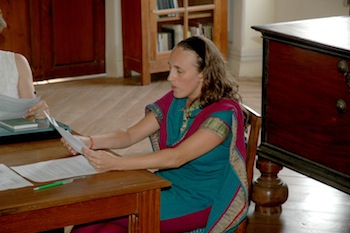
Lecture by Dr. Cristina Muru (University of Tuscia, Viterbo, Italy)
09 AUGUST 12
on Thursday, 9th August 2012 at 4.30 p.m. at the Library Hall of the EFEO, 19, Dumas Street, PondicherryTitle: Christian Concepts and Hindu Culture in Missionary TranslationsSummary: Cristina Muru discussed the notion of ‘translation' and how this was put into practice in the Christian religious books written in Tamil by Jesuit missionaries. She presented a comparative analysis of three different texts dating from the 16th to the 18th century: kompeciyoṉāyru (கொம்பெசியொனாய்ரு) by Father H. Henriques (16th cent.); Confessionario Tamulico and Dialogo entre o Confessor e o Penitente by the Portuguese Jesuit Father B. da Costa (17th cent.) and Dialogus inter Confessorem et Penitentem by the Italian Jesuit I. Desideri (18th cent.). These works are manuals concerning Confession and the Sacraments and explaining (which explain?) how to behave as a good Christian.
The presentation investigated the techniques that the missionaries used to select lexemes and words for translating Christian concepts. Two were the options at hand: either using borrowings from their mother tongues, i.e. cakkiṟamentu (< pt. sacramento, ing. sacrament) and kompecāri (< pt. confessar, ing. to confess), or using words already existing in the receptor language (Tamil, or in another Indian language like Sanskrit), i.e. corkkam, mokṣa for heaven and naraka for hell. The latter had the advantage of employing words that were easily recalled by native speakers. However, the missionaries had to adapt their original meaning in order to make them appropriate to the Christian concepts. Both techniques were observed in all the manuscripts whilst borrowings were predominant in the 16th century manuscript.
Contact: Dr. Cristina Muru, University of Tuscia, Viterbo, Italy
cristina.muru@unitus.it
lectures
The presentation investigated the techniques that the missionaries used to select lexemes and words for translating Christian concepts. Two were the options at hand: either using borrowings from their mother tongues, i.e. cakkiṟamentu (< pt. sacramento, ing. sacrament) and kompecāri (< pt. confessar, ing. to confess), or using words already existing in the receptor language (Tamil, or in another Indian language like Sanskrit), i.e. corkkam, mokṣa for heaven and naraka for hell. The latter had the advantage of employing words that were easily recalled by native speakers. However, the missionaries had to adapt their original meaning in order to make them appropriate to the Christian concepts. Both techniques were observed in all the manuscripts whilst borrowings were predominant in the 16th century manuscript.
Contact: Dr. Cristina Muru, University of Tuscia, Viterbo, Italy
cristina.muru@unitus.it
lectures
2023
2022
2021
2020
2019
2018
2017
2016
2015
2014
2013
2012
DECEMBER NOVEMBER OCTOBER SEPTEMBER AUGUST JULY JUNE APRIL MARCH FEBRUARY JANUARY 2011
2010
awards
concerts
conferences
departures
doctoral defences
exhibitions
lectures
our buildings
pattrika
publications
recruitment
scholarships
visitors
workshops
2022
2021
2020
2019
2018
2017
2016
2015
2014
2013
2012
DECEMBER NOVEMBER OCTOBER SEPTEMBER AUGUST JULY JUNE APRIL MARCH FEBRUARY JANUARY 2011
2010
awards
concerts
conferences
departures
doctoral defences
exhibitions
lectures
our buildings
pattrika
publications
recruitment
scholarships
visitors
workshops

